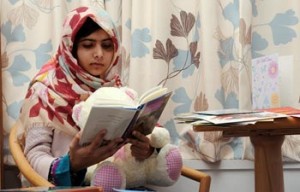Battling for a Basic Right: Education for Girls
Nov 23rd, 2012 | By admin | Category: Social JusticeBy Suzanne York, www.howmany.org
Sometimes change springs from the unlikeliest of people or places. Improving the educational opportunities of girls in Pakistan’s could now be taking shape, due to the shooting of Malala Yousufzai, a Pakistani teenage advocate for girls’ education. The fifteen-year-old was shot in the head when Taliban fighters boarded her school bus, severely injuring her and two other students.
Since the October shooting, much attention has rightly been focused on Malala’s passion of providing education for girls. Former UK Prime Minister Gordon Brown – now UN Special Envoy for Global Education – has been working hard to increase global aid money for education, especially that of girls, and in particular girls in Pakistan.
To raise more awareness on the shooting incident and the need for education, Brown’s UN office to declare November 10th “Malala Day.”
Earlier in November, Brown presented Pakistani President Asif Ali Zardari with a petition signed by two million people from around the world, calling for the right of a child to attend school (a similar petition originating in Pakistan garnered 1.2 million signatories).
According to Brown, “The president of Pakistan has agreed to work with the United Nations to ensure urgent delivery of education for all and to get Pakistan’s five million out-of-school children into education for the first time.” He also announced that three million Pakistani children from poor families will now begin to receive cash transfers in return for going to school.
Sadly, it has been reported that a British-based Islamist organization is planning to issue a fatwa, or religious decree, against Malala Yousufzai, accusing her of supporting “occupying” U.S. forces. A prominent radical cleric in Britain said “Malala is one of the issues we are going to be addressing because she is being used as a propaganda tool by the enemies of Muslims to say: “Look, Muslims don’t believe in education’ which is absurd.”
What happens with this remains to be seen. However, at least for status of girls education in Pakistan, the facts speak for themselves:
- Globally, 32 million school-aged girls do not receive an education; 3.1 million of these live in Pakistan;
- 50 million Pakistanis cannot read or write; two-thirds are women (this is the third highest in the world);
- Pakistan spends less money on education than any other South Asian country;
- Only 1 in 5 students in Pakistan’s semi-autonomous tribal region along the Afghan border is female.
All Malala wants is to attend school, and has ambition to become a doctor. There are many like her. Malala’s shooting is a call to action for girls’ right to education. Fortunately there are local organizations trying to change the situation. One is Citizen’s Foundation based in Karachi, which has built 838 private schools across Pakistan, and states that 50 percent of enrollment is comprised of girls. Another Pakistani organization is Khwendo Kor, bringing education to girls in remote, rural regions.
The state of girls education underscores the need to also educate boys and men to fully understand the benefits of educating and empowering females.
School for Husbands is a United Nations Population Fund sponsored program working with men and religious leaders that could provide some hope and guidance in Pakistan.
The initiative educates married men in Niger about reproductive health in order to improve access to maternal and newborn health services; sexual and reproductive health issues are also discussed. The schools are endorsed by traditional and religious leaders, and bring together well-respected men in the community to discuss specific concerns centered on reproductive health. As of March 2012, 137 schools have been established in southern Niger, and the countries of Burkina Faso and Guinea have expressed interest in the program.
While it doesn’t specifically target the importance of educating girls, it does represent a positive model to overcome socio-cultural-religious barriers, for the benefit of women and families.
Gordon Brown has said that today there is real momentum for change in Pakistan. As the country copes with rapid population growth, widespread poverty, high rates of gender inequality, militants, government corruption, and badly needed economic investment, providing education for all Pakistani girls and boys is one key step in the right direction. And just maybe it will encourage more young women like Malala around the world to take up the cause.
Suzanne York is a senior writer with the Institute for Population Studies
(photo credit: http://indiatoday.intoday.in/story/november-10-as-malala-day/1/228552.html)

